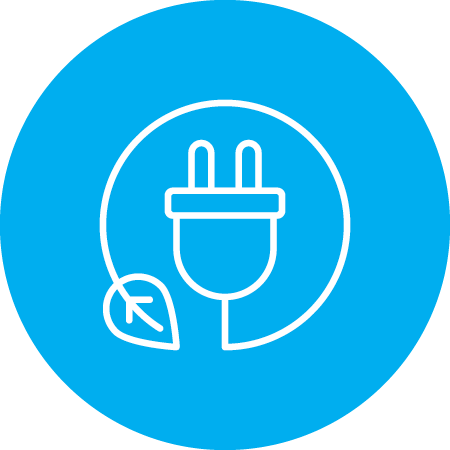
 NYC Housing Authority311
NYC Housing Authority311 Search all NYC.gov websites
Search all NYC.gov websites
2022 Progress Report on NYCHA’s Sustainability Agenda
This is a progress report for the Sustainability Agenda released in 2021

Energy and Carbon

Health And Wellbeing

Community

Resource Management

Economics
NYCHA’s Sustainability Agenda, released during NYC Climate Week 2021, is NYCHA’s 5-year roadmap for creating healthier, safer, and more comfortable homes for residents. The Agenda is based on the five sustainability themes of Carbon and Energy, Health and Wellbeing, Community, Facilities and Resource Management, and Economics. It’s guided by the following principles:
-
Sustainable Design – Ensure that New York City will have an affordable and thriving housing stock for the generations to come
-
Integration – Ensure environmental and social sustainability is integrated into all aspects of NYCHA’s work
-
Innovation – Implement innovative technical solutions to reduce greenhouse gas (GHG) emissions, waste, water consumption, etc.
-
Market Transformation – Use NYCHA’s purchasing power to drive and influence industry
-
Inclusive – Use an ethical and inclusive model to execute projects and support residents
The first update to the 2021 Sustainability Agenda comes just six months after the agenda’s release, but significant progress has already been made. For new initiatives, NYCHA is laying the groundwork for efforts that will scale up in coming years. As of Earth Day 2022, the following are summary updates to all goals and strategies included in the agenda.
Goal 1: Reduce greenhouse gas emissions by 80 percent by 2050
NYCHA is hard at work to reduce its GHG emissions by implementing its climate mitigation roadmap. Key strategies NYCHA relies on to reach its ambitious GHG reduction goal are building electrification, expanded solar installations, energy-saving building retrofits, and expanding reliance on electric vehicles.
Below are the highlights of work accomplished as of Earth Day 2022.
Commitments for Goal 1
Strategy 1 – Implement NYCHA’s GHG Reduction Roadmap
-
GHG Reduction – NYCHA’s annual 2021 GHG emissions dropped 13% from 2005 levels.
-
Energy Performance Contracts (EPC) – Submitted a $62 million EPC project to the U.S. Department of Housing and Urban Development (HUD).
-
Proptech Program – In 2021, NYCHA worked with the New York City Economic Development Corporation (NYCEDC) to award a contract to JLL and UrbanSense to vet and source proptech vendors for pilot demonstrations at NYCHA properties.
Strategy 2 – Advance electrification and deep energy retrofits
-
RetrofitNY – NYCHA completed the design phase of its RetrofitNY pilot, aimed at achieving transformative energy-used reductions at one building in NYCHA’s Ravenswood development and demonstrating the potential for scaling up deep energy retrofits. Construction is expected to start in the fall of 2022.
-
Heating Design-Build – Seven of the 11 developments of the Heating Design-Build agreement, which allows NYCHA to achieve greater energy efficiency and make progress toward electrification as it replaces aging heating systems, have been executed.
-
Clean Heat for All Challenge – In partnership with the New York Power Authority (NYPA) and the New York State Energy Research and Development Authority (NYSERDA), NYCHA issued a request for proposal (RFP) seeking a cold climate heat pump that can be installed through a window. The three agencies are evaluating six proposals and anticipate an award in summer 2022.
-
Decarbonization Map – NYCHA’s Decarbonization Map is updated as of April 2022.
Strategy 3 – Expand distributed energy resources
-
Solar – NYCHA is working to install 30 MW of distributed renewable energy by 2026. 5.216 MW of solar energy have been installed via NYCHA solar leases and in partnership with PACT developers; 8 MW are in progress.
-
Battery Storage – In partnership with NYPA and the National Renewable Energy Laboratory (NREL), NYCHA assessed the cost and feasibility of installing solar plus storage at two buildings at Borinquen Plaza. This study will result in an RFP for NYCHA's first solar plus storage project to be released 2022.
Strategy 4 – Expand electric vehicle program
-
Electric Vehicles (EV) Program – NYCHA placed an order for 15 additional Chevy Bolt EVs in 2021; this order will be received by the end of 2022.
-
Charging Stations – NYCHA identified Cypress Hills and Baisley Park as pilot sites for NYCHA’s first public EV chargers and is currently working with ConEd to make the necessary electrical upgrades.
Goal 2: Cultivate healthy and resilient communities based on design excellence
NYCHA strives to ensure that it is here to serve future generations, and to accomplish that we must adapt to the changing climate and landscape by incorporating best practices in energy, sustainability, and resiliency.
Below are the highlights of work accomplished as of Earth Day 2022.
Commitments for Goal 2
Strategy 5 – Update the NYCHA Design Guidelines and adopt sustainability standards
-
Design Guidelines – NYCHA is working to update Computer-Aided Design/Building Information Modeling (CAD/BIM) standards, gathering information needed to update its design guidelines
-
Physical Needs Assessments (PNA) – New PNA contract is anticipated to be awarded in spring 2022, which includes costing for energy savings and decarbonization opportunities.
Strategy 6 – Ensure healthy and hazard-free indoor environments
-
Roof Fan Replacement Program – NYCHA inspected every roof fan in a NYCHA building; any non-working fan was slated for replacement, and 93% of replacements are now complete. Of 8,441 roof fans, 5,672 have been replaced.
-
Clean Vents Initiative – NYCHA inspected all units to determine where cleaning was needed and has cleaned the ventilation systems of 61,044 units to date – 70% of units that were determined to require cleaning.
-
Leak Procedure Pilot 2.0 – In December 2021, NYCHA launched a pilot program at three developments aimed at improving the process for inspecting leaks and addressing them.
-
XRF Testing – NYCHA has attempted lead-paint testing at 5,285 units and completed inspections in 5,080 units out of the 32,225 units with a child under 6.
Strategy 7 – Expand the Green Infrastructure program
-
Green Infrastructure Projects – In partnership with NYC’s Department of Environmental Protection (DEP), NYCHA is installing green infrastructure projects at 42 developments. Fifteen sites are complete, 4 sites are in construction or pre-construction and will be complete by summer of 2022, and 16 sites have been designed.
-
Cloudburst Projects – NYCHA, in partnership with DEP, has completed designs for a sunken basketball court that will help manage heavy rains at South Jamaica Houses. NYCHA will begin design for cloudburst projects at seven additional sites in 2022.
Goal 3: Empower residents through community activation and workforce development
Through community activation, career development, and expansion of green spaces, NYCHA can support residents’ needs as it creates more sustainable spaces.
Below are the highlights of work accomplished as of Earth Day 2022.
Commitments for Goal 3
Strategy 8 – Connect residents to workforce development and entrepreneurship opportunities
-
Youth Workforce Development with Green City Force (GCF) – In March 2022, GCF launched EmPower at NYCHA, with the goal to employ 10 GCF alumni for a 10-month period to conduct energy audits.
-
Compost Power – GCF is increasing and improving composting capacity at EcoHubs, in addition to building and supporting community-led composting.
-
Tree Inventory – NYCHA completed another round of tree inventory in 2021.
-
Resident Business Development – In partnership with the Fund for Public Housing (FPH), NYCHA is creating a framework for a future NYCHA Business School.
-
Resident Business Opportunities – During October 2021, NYCHA launched Construction Business Pathways, an accelerated business development program for NYCHA residents who seek to start or grow their construction business. The first cohort had 29 enrollees.
Strategy 9 – Mobilize community activation through resident-led sustainability programming
-
Sustainability Grant Program – In partnership with FPH, NYCHA is identifying funding to support resident sustainability projects.
-
Campaign for a Clean NYCHA – NYCHA completed evaluations for five pilot sites selected to test approaches to public education campaigns related to waste management in December 2021. The results are expected in the spring of 2022.
Strategy 10 – Expand the Green Infrastructure program
-
Farms at NYCHA program – NYCHA currently has seven operational farms. The seven Farms at NYCHA sites have provided food security support throughout the pandemic. In 2021, farm achievements included the distribution of over 22,000 pounds of free, fresh produce grown by and for residents at farm sites, and collection of nearly 3,600 pounds of food scraps for composting.
-
Astoria Houses Green Classroom – In April 2022, the Astoria Houses Hydroponic Lab/Green Classroom opened. This classroom will be in Astoria Houses' Community Center and was created by the Environmental Justice Program at NYPA, which worked with partners to create a new food production resource.
Strategy 11 – Develop resident stewardship programs for NYCHA’s resilient landscapes
-
Butterfly Garden – In collaboration with the resident association, Bronx River Senior Center, and Youth Ministries for Social Justice, a butterfly garden is planned at Bronx River Houses.
Goal 4: Ensure efficient building operations and resource management
NYCHA needs significant sustainable infrastructure upgrades for waste and water management. In conjunction with improvements to equipment and resources, NYCHA is working towards building a culture of sustainability amongst its staff, especially front-line workers. Through continued staff training and recognition programs, NYCHA seeks to empower staff to build pride in their work and become environmental stewards.
Below are the highlights of work accomplished as of Earth Day 2022.
Commitments for Goal 4
Strategy 12 – Ensure proper maintenance and longevity of investments
-
Standard Procedures – NYCHA is reviewing janitorial and supervisors’ Standard Procedures to ensure that new sustainability investments, such as cardboard balers, are cared for in a proper manner for the lifespan of the equipment.
-
Staff Guidebook – In collaboration with NYC’s Department of Sanitation (DSNY), NYCHA is developing a caretaker’s guidebook focused on recycling collection and management. Anticipated release is 2022.
Strategy 13 – Re-envision waste management and recycling at NYCHA
-
Outdoor Recycling Centers – In March 2022, NYCHA released a request for information (RFI) for a mechanical collection pilot, bringing hoist-lifted trash collection to public housing developments. An RFP is expected in the summer of 2022.
-
Centralized Waste Yards – NYCHA has selected a vendor for its Design-Build Waste Yard Redesign project at seven developments. Additionally, 16 sites are in design procurement, with anticipated award in 2022.
-
Pneumatics System Collection – NYCHA has selected a vendor and anticipated award is spring 2022.
-
Zero Waste Program – NYCHA launched Recycle First in fall 2021 at all 10 Staten Island developments, a stepping stone toward a Zero Waste program, with the goal to shift staff mentality and update procedures on managing recyclables. The program will expand to Queens in 2022.
Strategy 14 – Design for circularity and recycle construction and demolition waste in Capital Projects
-
Tree Reuse Program – City Bench, a maker of wooden benches made from reclaimed urban trees, milled several oak trees that had to be removed at NYCHA's Red Hook campus in 2021. To facilitate larger scale reuse, NYCHA is coordinating with members of the Forest For All coalition with hopes of developing a citywide urban tree reclamation program.
Strategy 15 – Improve water management in buildings
-
Leak Prevention – NYCHA is working to pilot the installation of cure-in-place piping to cost effectively seal roof drain pipes and stop leaks.
-
Groundwater Re-use Study – NYCHA is studying the potential to reuse groundwater at sites where groundwater is present in basements.
Goal 5: Leverage all funding and financing toward healthier and decarbonized buildings
To achieve this goal, NYCHA is implementing six strategies.
Below are the highlights of work accomplished as of Earth Day 2022.
Commitments for Goal 5
Strategy 16 – Retain ownership of energy and water savings
-
Water Baselines – An EPC has been submitted to HUD with water baseline methodology and includes energy conservation measures for identifying and repairing water leaks.
Strategy 17 – Bring in more funding through the Preservation Trust
-
Preservation Trust – NYCHA has revamped advocacy for this strategy.
Strategy 18 – Bring in more funding through PACT
-
PACT Pipeline – NYCHA is working on multiple rounds of PACT projects to provide much-needed capital improvements. NYCHA is currently on PACT Round 12.
Strategy 19 – Earn revenue through energy and sustainability incentives and demand management programs
-
Demand Response Programs – In 2021, NYCHA received approximately $1.7 million in incentive and demand management programs from utilities.
Strategy 20 – Establish Green Revolving Fund
-
Green Revolving Fund – In 2021, NYCHA established the Green Revolving Fund with incentives and demand management programs from utilities.
Strategy 21 – Advocate for equitable investment in NYCHA
-
LL97 Working Groups – NYCHA is a part of the Local Law (LL) 97 Advisory Board, and the Multi-Family Working Group advocating for streamlined implementation and equitable investment in NYCHA properties.


